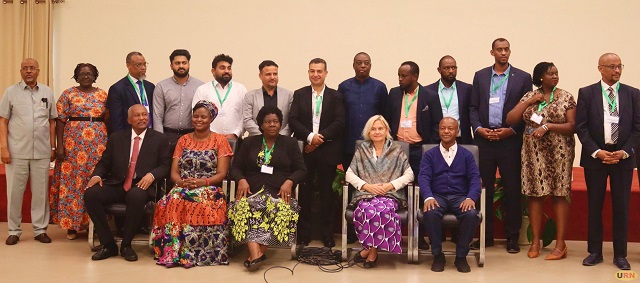
Entebbe, Uganda | THE INDEPENDENT | Transboundary traders are raising alarms about the exploitative practices of middlemen and the devastating outbreak of foot and mouth disease (FMD), which they say are major threats to the livestock and meat trade between IGAD exporting and MENA importing nations.
During the 3rd Private Sector Meeting of IGAD Exporting and MENA Importing countries, held at Best Western Hotel in Entebbe on Monday, traders voiced their challenges. The meeting, which brought together the Intergovernmental Authority on Development (IGAD) and Middle East and North Africa (MENA) regions, aims to strengthen collaboration for enhanced livestock and meat trade and investment.
Amos Tindyebwa, Managing Director of Fresh Cuts Limited, a meat processing company in Uganda, stated that his 17 years of business have suffered due to the FMD outbreak and the presence of business intermediaries, which have caused detrimental inflation in their international ventures.
To address these challenges, Tindyebwa revealed that industry stakeholders have formed the Uganda Meat Processors and Exporters Consortium under the Private Sector Foundation. This initiative aims to streamline operations and meet global standards in livestock and meat commerce.
Vyshakh Subhash from SIAM Group of Companies, one of the largest importers and suppliers of meat and frozen foods in the United Arab Emirates, advised IGAD member states to guide their exporters to form associations and list accredited firms in the livestock and meat trade to safeguard their interests and better negotiate with the large MENA markets.
Dr. Anna Rose Ademun, Commissioner of Animal Health at the Ministry of Agriculture, Animal Industry and Fisheries (MAAIF), described FMD as an endemic, severe, and highly contagious viral disease of livestock with significant economic impact. She assured attendees that efforts to control outbreaks and eventually eradicate the disease are underway.
Dr. Ademun emphasized that exporters and importers need to be well-informed about existing veterinary services and standards required by the International Trade and World Trade Organization to prevent economic losses.
Dr. Ameha Sebsibe, Head of Livestock and Fisheries at IGAD, highlighted that the IGAD region—a trade bloc comprising Djibouti, Ethiopia, Kenya, Somalia, Sudan, and Uganda—currently exports live animals and meat to MENA countries, meeting about 50% of live animal and 10% of meat market demands annually.
Dr. Ameha contends that the IGAD region has significant potential to increase its market share in MENA due to its proximity, similar animal body configuration and meat taste, and competitive pricing.
The 3rd Private Sector Meeting of IGAD Exporting and MENA Importing countries was organized by the IGAD Centre for Pastoral Areas and Livestock Development (ICPALD) in collaboration with the Food and Agriculture Organization (FAO).
The meeting aims to improve transparency, build trust, and enhance trade from the IGAD region to the 19 MENA countries, which include Algeria, Bahrain, Egypt, Iran, Iraq, Israel, Jordan, Kuwait, Lebanon, Libya, Morocco, Oman, Qatar, and Saudi Arabia, among others.
ICPALD statistics indicate that livestock constitutes a major economic, social, and cultural facet of life for over 250 million people in the IGAD region. The region has about 520 million livestock, of which 242 million (35%) are small ruminants.
Additionally, the region typically exports about 12.8 million heads of sheep and goats, as well as 60,000 tons of meat every year, accounting for about 6-10% of the GDP of the member state economies.
*****
URN
 The Independent Uganda: You get the Truth we Pay the Price
The Independent Uganda: You get the Truth we Pay the Price





